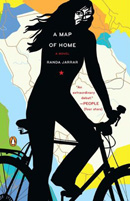
Jarrar's bold debut is seemingly effortless. She is a born storyteller who transports you with ease from Boston to Kuwait, then to Egypt when the Iraq invasion occurs, and then on to Texas, with Nidali, the young, intrepid protagonist, who should have been a boy.
When Nidali is born to her Egyptian-Greek mother and Palestinian father in 1970s Boston, her father is sure she is a boy and so names her Nidal, meaning 'struggle', mere minutes after she is born. Moments later, he wonders about the sex of the baby, but then dismisses it. Of course, it's a boy!
He's always known his firstborn would be a boy; he didn't want to 'witness his own girl's growing and going", as his six miserable sisters had. This was a boy! Only, it wasn't. And so, much to his wife's chagrin, Nidal became Nidali, with the "feminising, possessive, cursing 'I'" appended at the end to signify a girl's name.
There are many quirky Arab conventions in their home. The father is the incontrovertible boss, but his wife is by no means a doormat. If anything, she's a drama queen. She's a lapsed rock star who loves the piano; he's a lapsed poet. While the two adore one another, they are always at loggerheads, so Nidali finds school a welcome escape from home.
The family leaves Boston when Nidali is a baby, and, not long after, they move to Kuwait. Her father holds that moving is part of being Palestinian. He says, "Our people carry their homelands in their souls." But Nidali is not only Palestinian, she is also Egyptian, and Greek, and American. It's a continuous struggle for her to find her place and identity in the world.
Notwithstanding his Arabness and his set ways, her father is quite liberal and has decided that Nidali will be independent, unlike other Arab women. He emphasises education and demands that she excel. "I lost my home," he says to her, "and I gained an education...which later became my home. That can also happen to you."
Of course she hates the pressure, and rebels. Nidali has never been a doormat, either. She is a tough, outspoken,
if foul-mouthed, young thing. We follow her escapades with friends and (prohibited) boyfriends, as she explores
her sexuality and negotiates the murky waters of being a teenager in challenging circumstances: She is growing
up in an Arab home with all the rigidities of her Arab culture but with full exposure to the Western world
and all that it offers. A Map of Home is a great, sometimes sad, mostly funny read, but I daresay this
one will appeal more to young adult readers.

Penguin, paperback, 9780143116264
